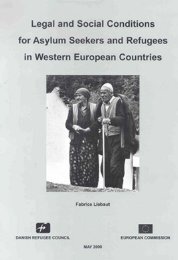Bulgaria - The social impact of seasonal migration
Bulgaria - The social impact of seasonal migration
Bulgaria - The social impact of seasonal migration
You also want an ePaper? Increase the reach of your titles
YUMPU automatically turns print PDFs into web optimized ePapers that Google loves.
48<br />
4. Impact <strong>of</strong> <strong>migration</strong> movements on the subject society<br />
4.1. Impact <strong>of</strong> e<strong>migration</strong><br />
4.1.1. Positive <strong>impact</strong> – the growing remittances<br />
Over the past decade, there has been observed a marked trend in the structure <strong>of</strong><br />
<strong>migration</strong> flows from <strong>Bulgaria</strong>. While in the early 1990, e<strong>migration</strong> for good dominated, in<br />
subsequent years <strong>migration</strong> was undertaken for shorter periods <strong>of</strong> time, with temporal,<br />
<strong>seasonal</strong> <strong>migration</strong> constituting an ever growing part <strong>of</strong> out-<strong>migration</strong> flows. Unfortunately,<br />
specialised research on patterns <strong>of</strong> <strong>seasonal</strong> <strong>migration</strong> from <strong>Bulgaria</strong> has not been done,<br />
and one has to rely on newspaper articles and in-depth interviews only.<br />
According to data provided by the <strong>Bulgaria</strong>n National Bank, the amount <strong>of</strong> remittances is<br />
growing every year and has even surpassed the amount <strong>of</strong> direct foreign investments in the<br />
<strong>Bulgaria</strong>n economy (Kapital 2003, 9-12). <strong>The</strong> National Bank keeps yearly statistics about the<br />
inflow <strong>of</strong> money sent by the <strong>Bulgaria</strong>n emigrants abroad, which, as it assumes, falls under<br />
the rubric "current private transfers". <strong>The</strong>se data are collected from the <strong>Bulgaria</strong>n banks,<br />
which are obliged to report on a monthly basis the size <strong>of</strong> transfers from abroad to <strong>Bulgaria</strong>.<br />
"In the last years, current private transfers comprising primarily transfers from emigrants<br />
and <strong>Bulgaria</strong>ns working abroad to their families in <strong>Bulgaria</strong> substantially rose both as an<br />
absolute sum and as a percentage <strong>of</strong> the GDP", says an analysis <strong>of</strong> the <strong>Bulgaria</strong>n National<br />
Bank on the balance <strong>of</strong> payments for January-November 2002. While in 1998 the amount <strong>of</strong><br />
current private transfers was 177.3 million USD, in 2001 it already reached 402.1 million<br />
USD. While in the former year current private transfers constituted 1.4% <strong>of</strong> GDP, in the latter<br />
they were already 2.5% <strong>of</strong> GDP. For the period January-November 2002, current transfers<br />
from <strong>Bulgaria</strong>ns living abroad amounted to 449.6 million USD, surpassing the amount <strong>of</strong><br />
direct foreign investments by 20.9 million USD and making 2.9% <strong>of</strong> GDP. 13<br />
Thus for the 11 months <strong>of</strong> last year, the remittances were 56.67 USD per person. A great deal<br />
<strong>of</strong> them were transferred through the non-banking systems <strong>of</strong> Western Union and<br />
MoneyGram, which have numerous <strong>of</strong>fices throughout <strong>Bulgaria</strong> and a vigorous advertising<br />
campaign in electronic and paper media. According to the data <strong>of</strong> the <strong>Bulgaria</strong>n National<br />
Bank, remittances surpassed by far the financial help coming from the EC pre-accession<br />
funds, which for January-November 2002 amounted to 100.8 million USD. Some experts<br />
believe the size <strong>of</strong> remittances is also comparable to the amount <strong>of</strong> the export <strong>of</strong> <strong>Bulgaria</strong>n<br />
goods abroad. <strong>The</strong>y think that remittances are responsible for the state <strong>of</strong> growing trade<br />
and consumption at a time <strong>of</strong> shrinking production in <strong>Bulgaria</strong>, stating that "<strong>Bulgaria</strong> gains<br />
more from the export <strong>of</strong> people than from the export <strong>of</strong> goods". According to data <strong>of</strong> the<br />
State Agency for <strong>Bulgaria</strong>ns Abroad, at least 300 000 <strong>Bulgaria</strong>n emigrants send their families<br />
in <strong>Bulgaria</strong> small amounts <strong>of</strong> money, ranging from 100 to 300 USD. <strong>The</strong>y function as a kind<br />
<strong>of</strong> <strong>social</strong> assistance, provided through migrants' work abroad rather than from the state<br />
budget.<br />
13 According to sociologists from the Social-democratic Institute in S<strong>of</strong>ia, remittances constitute 800 million<br />
BGN a year. 26% <strong>of</strong> families in <strong>Bulgaria</strong> have relatives abroad. In addition to the financial assistance from<br />
abroad, 100 million EUR are imported by the <strong>seasonal</strong> workers in Greece and Western Europe. Comparing<br />
<strong>Bulgaria</strong> to Albania and post-war Serbia whose populations were supported through emigrant money, one<br />
<strong>of</strong> the leaders <strong>of</strong> the <strong>Bulgaria</strong>n Socialist Party concluded that the foreign businesses' trust in <strong>Bulgaria</strong> had<br />
declined, using <strong>migration</strong> in the internal political power struggle (24 chasa: 2003)

















